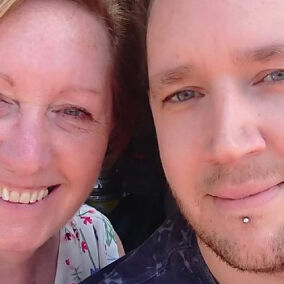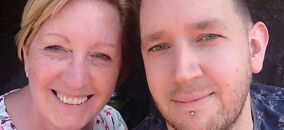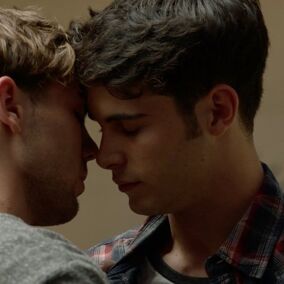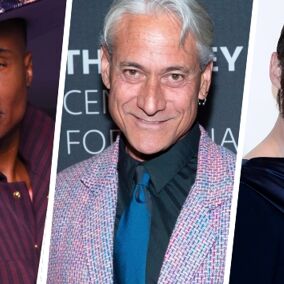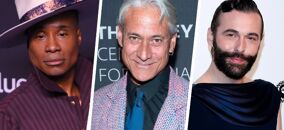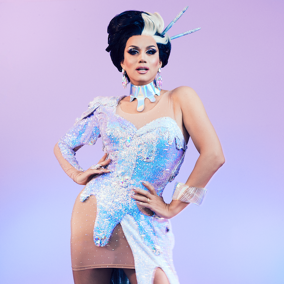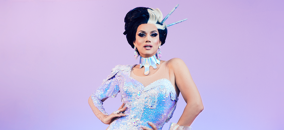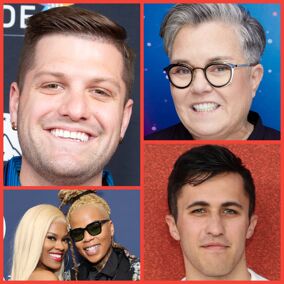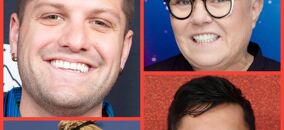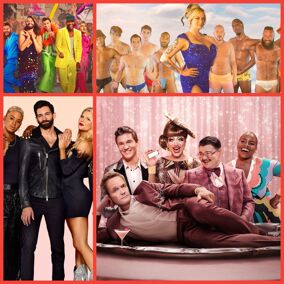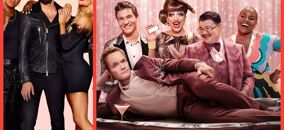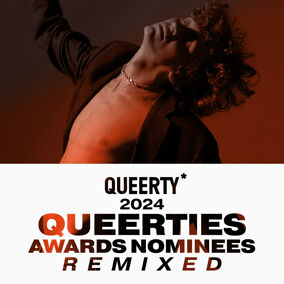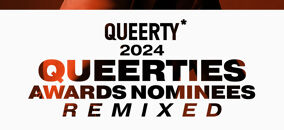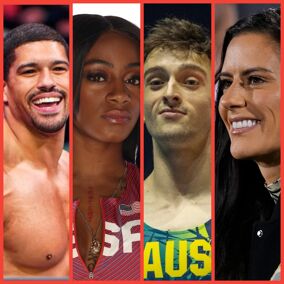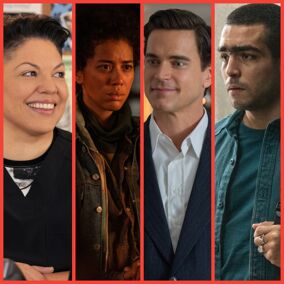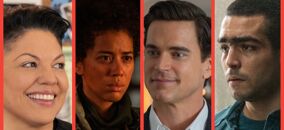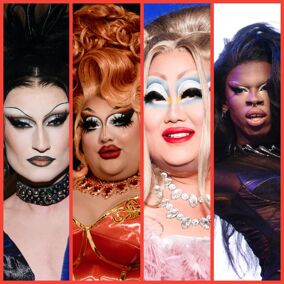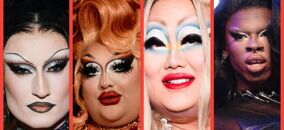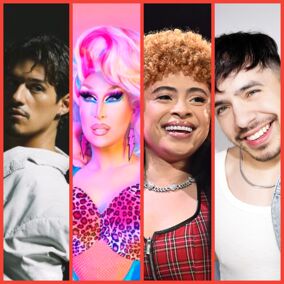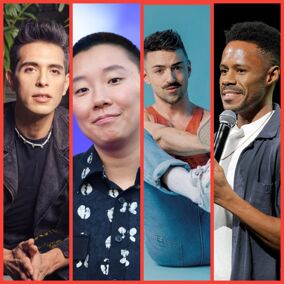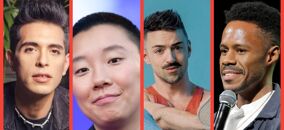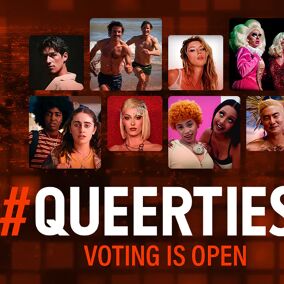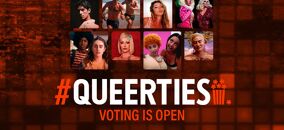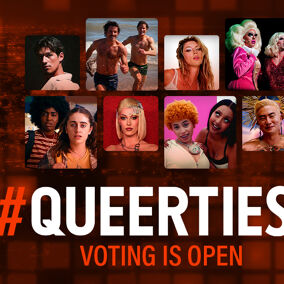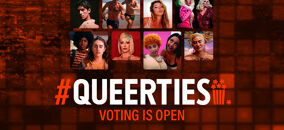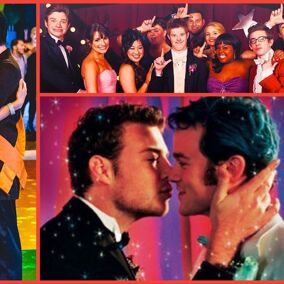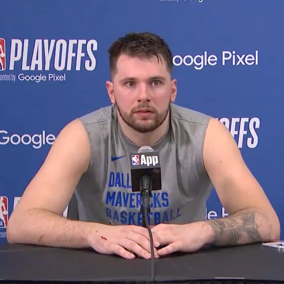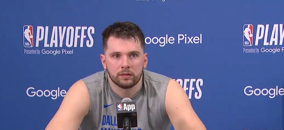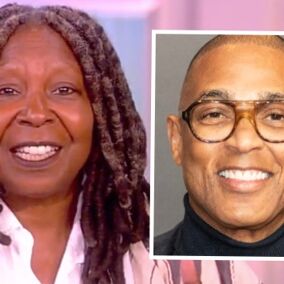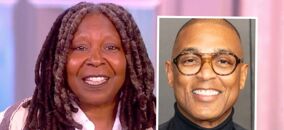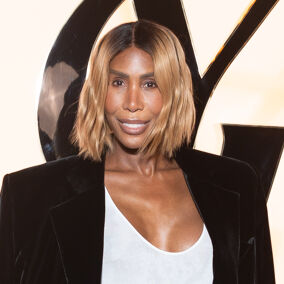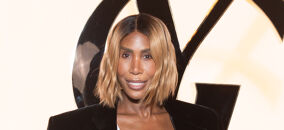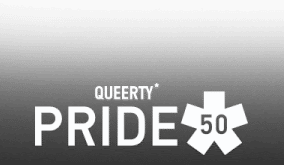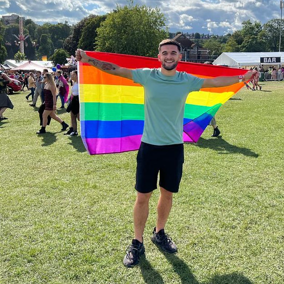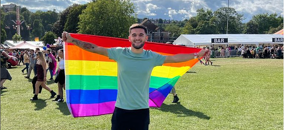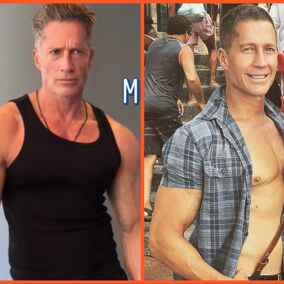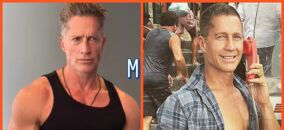
If you’ve seen our video of historian Eric Cervini leading a discussion with four LGBTQ luminaries about Peter Staley’s memoir Never Silent: ACT UP and My Life in Activism, you know there’s a lot to unpack there.
From a closeted Wall Street trader diagnosed with AIDS in the ’80s, Staley went on to become one of the foremost HIV activists of all time, advancing the cause of HIV/AIDS funding and treatment in brilliant acts of defiance that captured public attention.
After filming the conversation, we popped a few extra behind-the-scenes questions for guests: podcaster Mike Balaban, Autostraddle cofounder Riese Bernard, trans activist and coach Blossom C. Brown, and author/screenwriter Abdi Nazemian.

Happy Pride! How are you celebrating this year?
How about we take this to the next level?
Our newsletter is like a refreshing cocktail (or mocktail) of LGBTQ+ entertainment and pop culture, served up with a side of eye-candy.
Balaban: As I relocated from NYC to San Diego during COVID and Pride will be celebrated almost normally this year for the first time since 2019, I intend to participate in a variety of San Diego Pride-related events. But, true to my Manhattan roots, I’ll also be returning to NYC and participating in Stonewall 53 during the last week in June.
Nazemian: My brilliant husband Jonathon Aubry and his team at Aubry and Co. have been instrumental in bringing LA Pride to life this year, so our kids and I will be proudly by his side as much as possible for the festivities. I’m most excited for the parade, and to see Christina Aguilera and Anitta perform. I think we all need to feel community around us right now.
Bernard: Going to some outdoor events in Los Angeles.
Brown: This year I am celebrating with my amazing friends. It’s been two years since we really enjoyed the festivities of Pride and it will feel so good to be back this year.

How can you apply lessons you learned from Peter Staley’s memoir “Never Silent” to your everyday life today?
Balaban: As we prepare to fight the renewed forces opposing LGBTQ rights that have been unleashed, our righteousness, our long history of stigmatization and marginalization, and our common bonds as an outsider community are the fuel that will power us to victory, just as they worked for ACT UP and that earlier generation of LGBTQ activists.
Nazemian: There’s a beautiful through-line of community and forgiveness in the book, both forgiveness of others, and doing the hard work of self-forgiveness. Peter Staley found ways to let rage motivate him without losing sight of the importance of forgiveness, family, and friendship. It’s so easy to get lost in anger these days, especially with the way social media activates us. I’m going to do my best to remind myself to always balance anger with forgiveness of others, self-forgiveness, and a celebration of community.
Bernard: Accepting that activist and cause-driven progressive LGBTQ organizations will inevitably have ideological splits, and that’s okay — within reason, we don’t have to all agree on the “correct” approach to the issues we’re confronting. Some will have more radical ideas than others, and often we just have to give whatever we can do a trial and see what works. And it’s also okay to divide a group into smaller groups as those ideological splits become more pronounced. That doesn’t mean the group failed, it just means that its membership is evolving, and as we face challenges together, there might be different conclusions reached about how change should happen.
Brown: I think applying strategy is something that is key. Learning to be strategic and really lead with intention when advocating for what is right.

Peter writes about “standing on the shoulders of thousands of brave warriors who came before us.” What can we do today that will benefit people 30 years from now?
Balaban: We must tell our stories so they won’t be forgotten and create new stories through our activist efforts today. Maintaining links of continuity between generations is the key to success. For the first time, our stories are not hidden in the shadows and we must ensure they remain front and center.
Nazemian: It’s hard to predict what will make an impact 30 years from now, but storytelling is my form of activism. I know that my novel Like a Love Story has introduced a new generation to an important chapter in our queer history because I’ve been a part of so many inspiring classroom discussions at high schools across the country that have read the book. I’m committed to telling more queer stories, especially queer Iranian stories, in hopes it can have a long-term impact. But I’m also aware that to be a good storyteller, you can’t think about future impact. You just have to write with honesty and vulnerability, let the stories go, and hope they resonate.
Bernard: Everything we’re doing to fight against income inequality, racialized violence, anti-trans legislation, queer media visibility — all of it will benefit LGBTQ people 30 years from now. We can’t ever take any gains for granted; progress moves backward all the time and right-wing legislators will always need new ways to drum up fear amongst their electorate to raise money for their campaigns by targeting vulnerable populations. We also can’t ignore local politics, where it’s often easier to make change happen.
Brown: We can honestly begin to build the foundation for them to stand in the same way those who came before us did it so that we could stand. Being able to lead by example will spark something inside of our community 30 years down the road that can help them stand on the side of justice.

Peter also writes: “If something pisses me off, I work toward changing it.” What are you pissed off about and how are you working to change it?
Balaban: The things that piss me off today are numerous and, unfortunately, growing—“Don’t Say Gay” legislation, anti-trans bills and attitudes both externally and within the community, the anti-abortion judicial rulings to date, and probably yet to come. I’ve been an activist for decades. For almost 30 years, I’ve continuously served on multiple non-profit boards. I give money to countless causes and I mobilize others in our community via my social media platforms to step up and actively join this struggle.
Nazemian: My children are my whole world. But even before having kids, I was appalled at how little our society seems to care about its youngest members. From lack of educational funding to separating children from their parents to gun control inaction, to banning queer books in schools, to the horrific attacks on trans youth, I’m constantly enraged by the way we let kids down. Much of my work is in young adult literature. Beyond writing the books themselves, the most rewarding part of my job is visiting schools to discuss the books. Spending time with young people is so inspiring and fills me with hope for the future.
Bernard: Well right now it’s gun control in the U.S., or the lack thereof, and Republican lawmakers’ complete lack of regard for human lives and their insistence on “solutions” for school shootings that have been proven, especially at Uvalde, to not work. I’m pissed off about 18-year-olds being able to buy assault rifles. Right now I’m just donating to GoFundMes and Everytown and helping to make space on my website for people to process how they’re feeling. I don’t know what I’ll do in the future.
Brown: I am pissed off at anti-Blackness and transphobia. For too long we have seen it in our community and it’s time to correct and do better about it. I am bringing intentional awareness to being able to open dialogue as it’s important to get down to the root of what is causing it.

What other books by LGBTQ authors are on your bedside table right now?
Balaban: I’ve been urged to read Detransition, Baby by Torrey Peters. And the New York Times review of Secret City: The Hidden History of Gay Washington by James Kirchick makes me want to slowly digest that rich resource (it’s 826 pages).
Nazemian: I recently finished 100 Boyfriends by Brontez Purnell, Limbic by Peter Scalpello, and Dancing Ledge by Derek Jarman. I always have a giant stack of books waiting to be read. Some I’m especially excited for are Other Names for Love by Taymour Soomro, Love in the Big City by Sang Young Park, Bolla by Pajtim Statovci, Please Miss by Grace Lavery, and I need to get my hands on the latest from Dean Atta, Only on the Weekends.
Bernard: We Do What We Do in the Dark by Michelle Hart, Like a Love Story by Abdi Nazemian, and 100 Boyfriends by Brontez Purnell.
Brown: Tell Me How Long the Train’s Been Gone. James Baldwin’s activism is so instrumental, especially as someone who uses his voice to speak power.
Don't forget to share:



